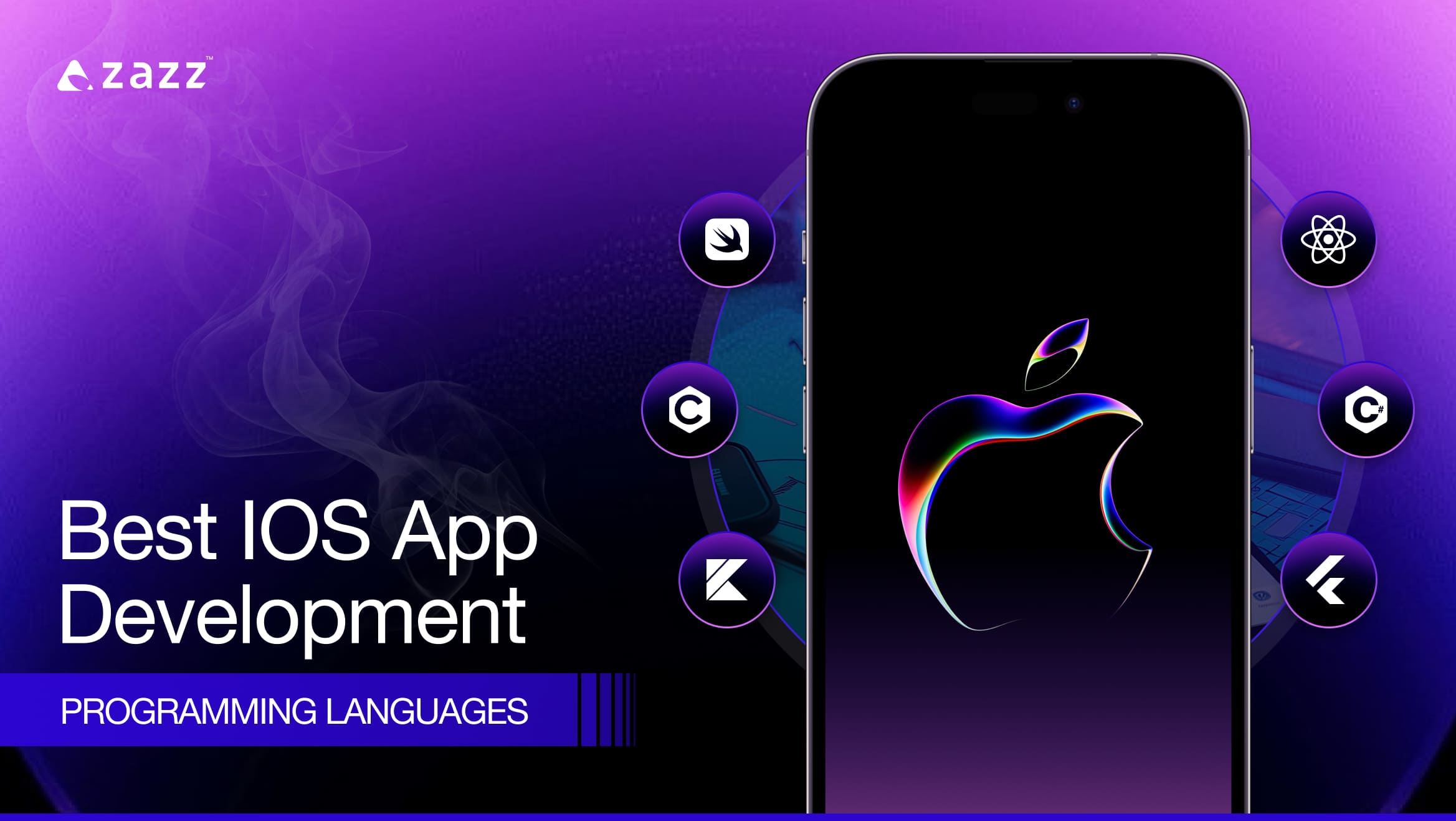
The iOS ecosystem, dominated by Apple, has grown into one of the most lucrative markets for app developers worldwide. With the constant evolution of technology, iOS app development requires developers to adapt quickly, ensuring they are using the best programming languages and frameworks available. As we look ahead to 2025, understanding which programming languages to use for building iOS apps is essential for staying competitive in the mobile app industry.
In this blog, we will explore the best iOS app development coding languages in 2025, including their strengths, features, and where they stand in the mobile development landscape. We’ll also cover the top programming languages for iOS app development, focusing on their specific advantages for building apps on the iPhone and iPad. Additionally, we’ll explore which language for developing iOS apps will be the most relevant in the coming years.
What Makes a Good iOS app Development Language?
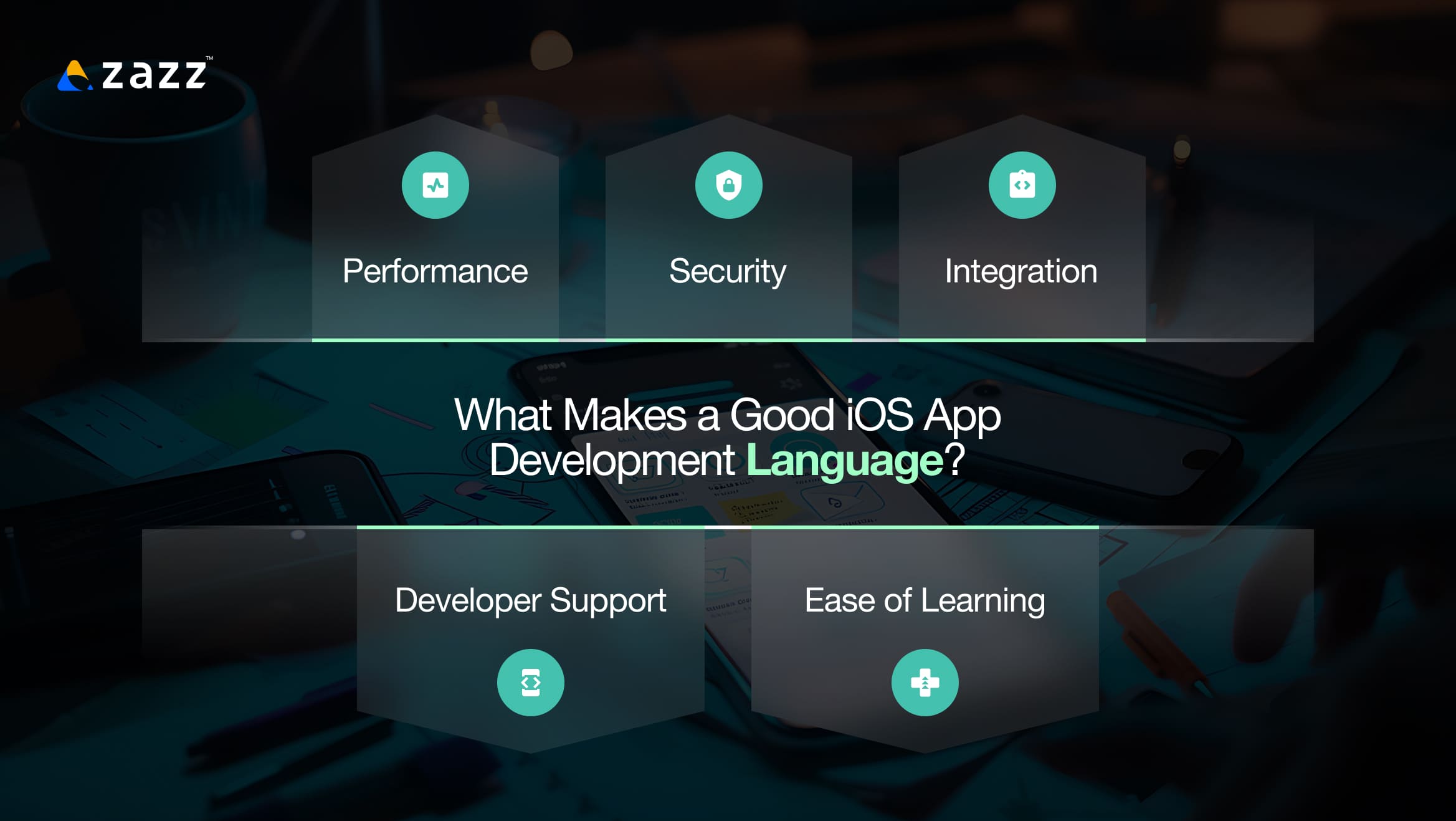
To understand which programming languages are the best for iOS development, we must first identify what makes an ideal language for building iOS apps. A programming language for iOS app development should have the following characteristics:
- Performance: The language must offer fast execution to ensure smooth and responsive apps, especially when dealing with graphics, animation, or complex tasks.
- Security: With the growing focus on privacy and data security, the language used for iOS app development must have strong security features.
- Integration: The language should be compatible with Apple’s SDKs and frameworks, providing easy access to iOS-specific APIs, such as Core Data, ARKit, and SwiftUI.
- Developer Support: The availability of resources, libraries, and a strong developer community is essential. Languages with an active community allow developers to solve problems quickly and innovate continuously.
- Ease of Learning: A language with clear syntax, easy-to-understand principles, and effective error handling helps developers produce high-quality code faster.
Related reading: iOS App Development Process
6 Top Programming Languages for iOS App Development in 2025
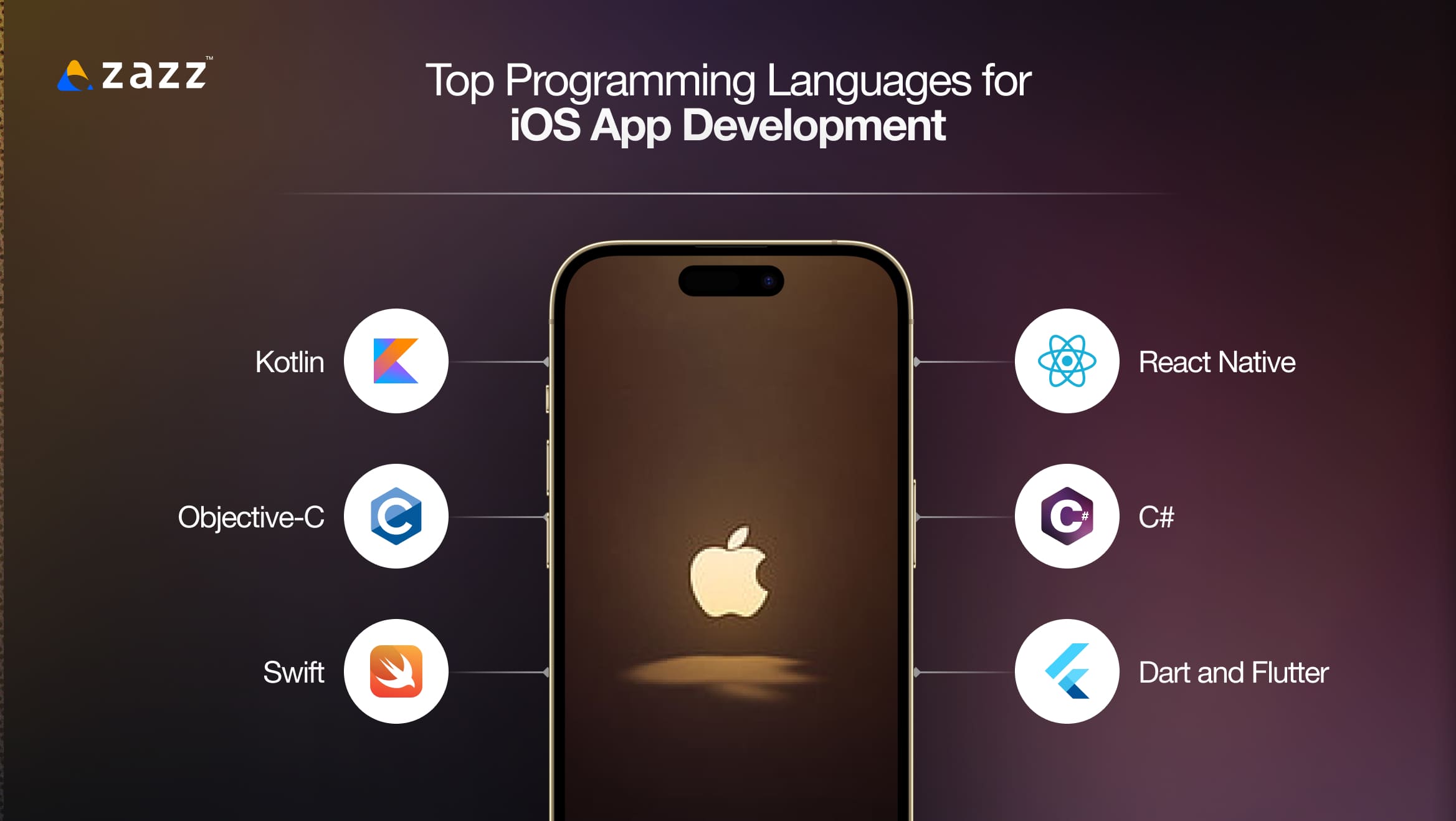
1. Swift – The Best Language for iOS App Development
Swift has been Apple’s flagship programming language since its introduction in 2014, and it continues to dominate the iOS development space. Swift is by far the best language to develop iOS apps, and its popularity is expected to remain steadfast in 2025. Swift offers a modern, safe, and fast development environment that is specifically designed for building iOS apps.
Why Swift is the Best Programming Language for iOS App Development in 2025:
- Native Performance: Swift is optimized for performance on Apple’s devices, offering fast and efficient code execution. Its low-level access to hardware and memory allows developers to build apps that run smoothly on both older and newer devices.
- Safety and Security: Swift is designed to minimize the potential for programming errors, which can lead to vulnerabilities. Features like automatic memory management and strict type checking make it a secure choice for developing robust apps.
- Easy to Learn: Swift has a clear and concise syntax that makes it easy for both novice and experienced developers to get up to speed quickly.
- Integration with Apple’s Ecosystem: Swift integrates seamlessly with Apple’s vast ecosystem, including iOS, macOS, watchOS, and tvOS. It is the primary language used to access Apple’s frameworks and libraries, like UIKit and SwiftUI, making it the language required for iOS app development.
- Continuous Improvement: As an open-source language, Swift is continually updated by both Apple and the broader developer community, ensuring it remains a modern tool for developing iOS apps.
In 2025, Swift will continue to be the language used to develop iOS apps for all types of applications, from simple utility apps to sophisticated, feature-rich mobile solutions.
2. Objective-C – A Legacy Language for iOS Apps
Although Swift has largely supplanted Objective-C for new iOS app development, this language is still important in the iOS ecosystem, especially for maintaining legacy codebases and ensuring compatibility with older applications. Objective-C remains one of the most important programming languages for iOS app development, particularly for app developers who need to update or work with older apps built before Swift’s introduction.
Why Objective-C is Still Relevant for iOS App Development:
- Backward Compatibility: Objective-C is essential for developers working with legacy code or apps that rely on this language. Many older apps, especially large-scale enterprise applications, still use Objective-C and require ongoing support and maintenance.
- Seamless Integration with Swift: Objective-C and Swift can coexist in the same project, allowing developers to take advantage of Swift’s modern features while maintaining compatibility with older Objective-C codebases.
- Mature Libraries and Frameworks: Objective-C has a long history, which means it benefits from a vast collection of libraries and frameworks that are still valuable today.
While Objective-C may not be the first choice for new app development, it remains a crucial development language for iOS apps when working with older applications or specific projects that require deep integration with existing systems.
3. Kotlin – A Cross-Platform Option for iOS App Development
Kotlin has become the preferred programming language for Android development, but it is also gaining traction for iOS app development due to its ability to support cross-platform development through Kotlin Multiplatform. This capability allows developers to write a single codebase that can be shared between Android and iOS apps, making Kotlin a powerful choice for businesses and developers looking to target both platforms.
Why Kotlin should be considered among all iOS mobile App Development languages:
- Cross-Platform Support: Kotlin Multiplatform allows developers to share business logic and other non-platform-specific code between Android and iOS, resulting in faster development and lower maintenance costs for cross-platform apps.
- Interoperability with Swift: Kotlin is fully interoperable with both Java (for Android) and Swift (for iOS), allowing developers to leverage existing codebases in both languages.
- Concise Syntax: Kotlin’s syntax is more concise and easier to maintain than Java, making it a popular choice for developers looking for a modern language for app development.
Kotlin, especially when combined with Kotlin Multiplatform, offers a compelling solution for developers building cross-platform iOS apps, making it a top contender for companies with a presence on both iOS and Android.
4. C# – Xamarin for Cross-Platform Development
Xamarin, powered by Microsoft, allows developers to use C# for cross-platform mobile development. Xamarin enables the sharing of most of the code between iOS and Android apps, which can significantly reduce the time and effort required to create apps for both platforms.
Why C# and Xamarin are Effective for iOS App Development:
- Single Codebase for iOS and Android: Xamarin allows developers to write code once and deploy it across multiple platforms, making it ideal for teams that need to target both iOS and Android with minimal effort.
- Access to Native APIs: Xamarin provides access to native APIs on both platforms, ensuring that apps perform similarly to native apps written in Swift or Objective-C.
- C# Ecosystem: C# is a well-established language with a large ecosystem and robust libraries, making it easier for developers to integrate third-party tools and libraries into their apps.
For companies looking to build cross-platform apps quickly and efficiently, Xamarin remains a strong iphone mobile app development language, offering high performance and native-like capabilities on iOS.
5. React Native (JavaScript) – Popular for Cross-Platform Development
React Native, developed by Facebook, is one of the most popular cross-platform frameworks for mobile app development. Using JavaScript and React, React Native allows developers to build apps for both iOS and Android using the same codebase.
Why React Native is a Strong Choice for iOS App Development:
- Cross-Platform Development: React Native enables the development of iOS and Android apps using a single codebase, reducing development time and costs.
- JavaScript Ecosystem: React Native leverages JavaScript, one of the most widely-used programming languages, allowing developers to use familiar tools and libraries.
- Native Performance: React Native allows developers to access native APIs, ensuring that the app feels and performs like a native iOS app.
- Active Developer Community: React Native benefits from a large and active community, which provides libraries, solutions to common problems, and an ever-growing ecosystem of tools.
React Native remains a top programming language for iOS app development, especially for startups and businesses that want to build cross-platform apps quickly without sacrificing performance or user experience.
6. Dart and Flutter – A Fast-Growing Framework for iOS Apps
Flutter, powered by Google, is another popular cross-platform framework that allows developers to build native-like apps for iOS and Android using a single codebase. Flutter uses Dart, a language created by Google, to enable high-performance app development.
Why Dart and Flutter are Excelling in iOS App Development:
- Fast Development: Flutter’s hot reload feature allows developers to see changes in real time, accelerating the development process and making it easier to experiment with UI and features.
- Customizable UI: Flutter provides rich sets of widgets that allow developers to create highly customizable UIs that look and feel native on both iOS and Android.
- High Performance: Dart is a compiled language, which ensures high performance, even for resource-intensive applications.
- Cross-Platform Codebase: Like other cross-platform frameworks, Flutter allows developers to write a single codebase for both iOS and Android.
With its fast development cycle and ability to deliver high-performance apps, Flutter is emerging as one of the best iOS app development programming languages for cross-platform development.
Related reading: Common Issues Faced By Developers While Developing an iOS App
Enhancing iOS App Development with Advanced Techniques
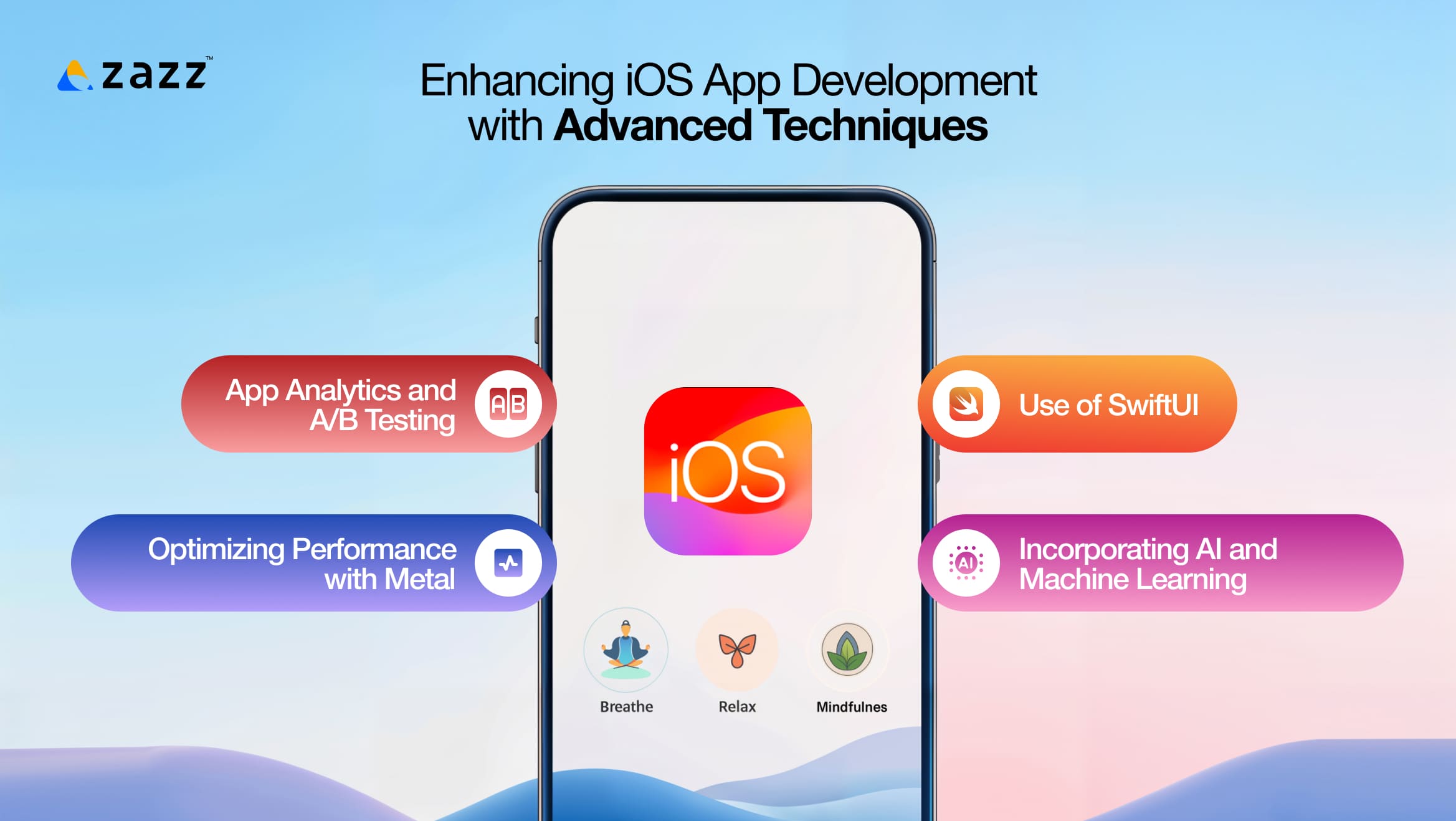
To stay ahead in the competitive iOS app market, developers must embrace advanced techniques that enhance the app development process. Here are a few ways to optimize your iOS app development:
- Use of SwiftUI: SwiftUI is Apple’s declarative framework for building user interfaces. By using SwiftUI, developers can write less code, create dynamic UIs, and ensure the app’s UI is optimized for all Apple devices.
- Optimizing Performance with Metal: Metal is Apple’s low-level graphics API designed for performance-intensive applications like games and high-performance apps. Developers can use Metal to directly interact with the GPU, ensuring smoother graphics and animations.
- Incorporating AI and Machine Learning: With Apple’s CoreML framework, developers can integrate machine learning models into their iOS apps, enabling intelligent features such as image recognition, predictive text, and recommendation systems.
- App Analytics and A/B Testing: To improve user experience and app functionality, integrate analytics tools and conduct A/B testing to gain insights into how users interact with the app and identify areas for improvement.
Importance of Choosing the Right Programming Language for iOS Development
The language used for iOS app development plays a crucial role in the success of an app. By choosing the right apple mobile app development language, developers can ensure optimal performance, easy maintainability, and a seamless user experience. The wrong choice can lead to slow app performance, difficulty integrating new features, or compatibility issues with different iOS versions and devices.
Additionally, using a language that aligns with the team’s expertise and project needs can reduce development time and costs. As technology continues to evolve, the best language for iOS app development will shift, but making an informed decision now can significantly impact the future of your app and its users. Whether you’re building a native iOS app with Swift or opting for a cross-platform solution like React Native, the right programming language can enhance your app’s capabilities, reach, and overall success.
Factors to Consider When Choosing an iOS Programming Language
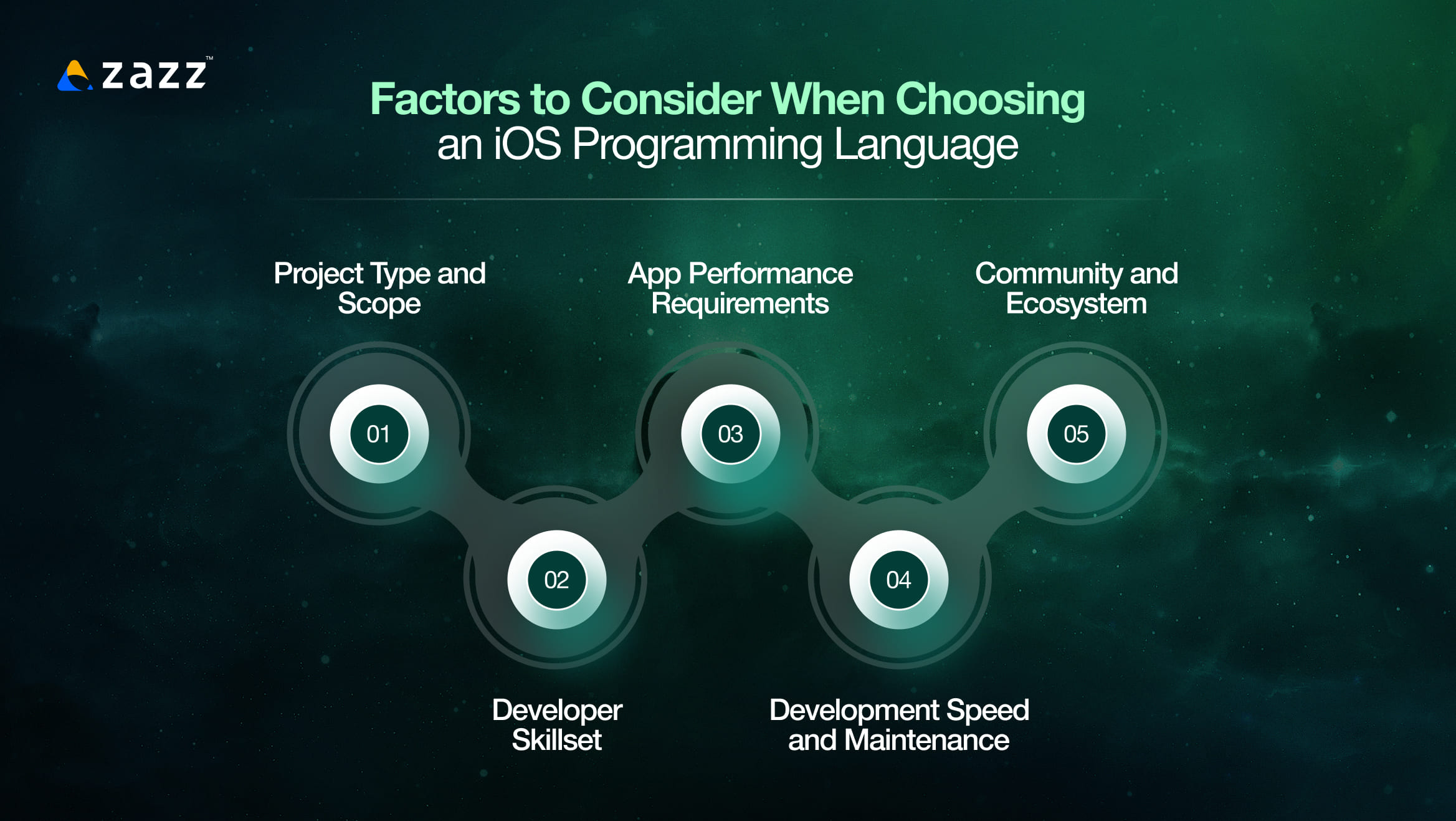
Choosing the best programming language to develop iOS apps depends on several factors that can impact the success and efficiency of your development process. Here are key factors to consider:
1. Project Type and Scope
- Native or Cross-Platform: Decide whether you need to develop a native iOS app (e.g., using Swift or Objective-C) or a cross-platform app (e.g., using React Native or Flutter). If your app needs to leverage device-specific features or require superior performance, native languages like Swift are recommended.
2. Developer Skillset
- Experience: If your development team is experienced with a specific language, such as Swift or JavaScript, it may be beneficial to stick with that language. However, if you’re starting from scratch, consider the learning curve and documentation available for each language.
3. App Performance Requirements
- Complexity and Resources: If your app involves intensive computations, animations, or graphics, a native language like Swift offers better performance. On the other hand, if the app’s performance requirements are less stringent, a cross-platform solution like React Native or Flutter could be more appropriate.
4. Community and Ecosystem
- Support and Resources: Opt for languages that have an active developer community, as this ensures a wealth of resources, tutorials, third-party libraries, and frameworks to help speed up development and solve problems.
5. Development Speed and Maintenance
- Time and Cost Efficiency: For faster development and lower costs, cross-platform languages like React Native or Flutter can be ideal since they allow you to reuse code across both iOS and Android. For ongoing maintenance, consider how easy it is to update and scale the app using the chosen language.
Related reading: How to Find Best Company to Start My iOS App Development Project?
Conclusion: The Best iOS App Development Programming Languages in 2025
As we approach 2025, the choice of apple app development programming language will largely be driven by specific project requirements, the developer’s familiarity with certain languages, and whether cross-platform development is a priority.
For native iOS apps, Swift remains the best programming language for iOS app development, offering excellent performance, safety, and integration with Apple’s ecosystem. Objective-C still has a place in maintaining legacy applications, but Swift is likely to dominate the future of iOS app development.
For cross-platform solutions, Kotlin with Kotlin Multiplatform, React Native (JavaScript), and Flutter (Dart) are all excellent choices, enabling developers to build iOS apps while also targeting Android users. C# and Xamarin provide another solid option for cross-platform mobile app development, especially for enterprise-level applications.
In 2025, the best language for iphone app development will depend on the project’s needs—whether it’s building a high-performance native iOS app with Swift or creating a cross-platform app with React Native or Flutter. Each language has its unique strengths and use cases, so developers will need to choose the iphone app development programming language that best aligns with their goals.
Frequently Asked Questions
The best programming language for iOS app development in 2025 is Swift. It remains the go-to choice for developers due to its speed, performance, and seamless integration with Apple’s ecosystem. Swift is designed for modern app development, offering a safe and efficient way to build apps for iOS, macOS, watchOS, and tvOS. Its simplicity, combined with powerful features like automatic memory management and error handling, makes it an ideal choice for native iOS development.
Swift offers several advantages for iOS app development:
- Performance: Swift is optimized for speed and efficiency, ensuring smooth and fast app performance.
- Safety: Swift’s strong type safety and error-handling features reduce the risk of bugs and crashes.
- Modern Syntax: Swift has a clean, readable syntax that is easier for developers to learn and maintain.
- Apple Ecosystem Integration: Swift works seamlessly with Apple’s frameworks, such as UIKit, SwiftUI, and Core Data, making it perfect for creating apps that fully integrate with iOS devices.
- Open Source: Swift is open-source, allowing developers to contribute to its development and share resources.
Yes, Objective-C is still a relevant language for apple app development, especially for maintaining legacy apps or working with older codebases. However, Swift has largely replaced Objective-C for new app development due to its modern features, safety, and performance. Objective-C remains crucial in situations where there is a need for backward compatibility with existing apps, or when integrating with specific libraries or tools that are built using Objective-C.
Kotlin is gaining traction for iOS app development, particularly through Kotlin Multiplatform. This allows developers to write shared code for both iOS and Android applications. Kotlin enables faster development for cross-platform apps by allowing developers to reuse business logic, data models, and other core components between the two platforms. While it is more commonly used for Android development, Kotlin’s ability to work across both iOS and Android makes it a growing option for teams targeting both platforms.
React Native and Swift serve different purposes in iOS app development. While Swift is the best choice for building native iOS apps, React Native is a framework for cross-platform development, allowing developers to build both iOS and Android apps using a single codebase written in JavaScript. React Native is ideal for developers looking to target both platforms with less development time, but it may not offer the same level of performance or native feel as a fully native app written in Swift. React Native is suitable for apps that don’t require complex native functionality, while Swift is better for performance-intensive or device-specific applications.
Choosing the right apple mobile app development language is critical because it directly impacts the performance, scalability, and maintainability of the app. The language affects how well the app integrates with Apple’s hardware, how easily developers can implement new features, and the overall user experience. Using a language that is optimized for iOS, like Swift, ensures that apps run efficiently and securely. Additionally, choosing the wrong language can lead to issues with debugging, app updates, and cross-platform compatibility, ultimately affecting time-to-market and app success.
Recent Articles
Table of Content 1. Data Engineer vs. Data Scientist: Understanding...
Table of Content 1. What is the Carnival in Brazil?...
Table of Content 1. What is IT Staff Augmentation? 2....












